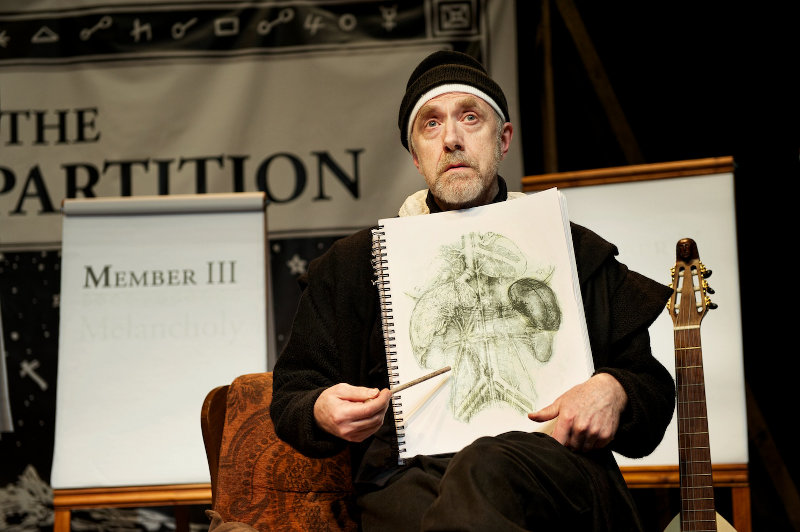To translate a 1500 page 17th Century tome on the philosophy and physical manifestations of depression and other mental maladies into engaging theatrical form is a quixotic endeavour, even exhibiting signs of madness itself. Theatrical innovators Stan’s Cafe make no concession to the density or erudition of the original. However, their edit cleverly converts Robert Burton’s monologue into four voices, which, diversely, represent the four humours (a concept crystallised by this text for his contemporaries) or the four ages of man (Gerard Bell makes excellent play of the poor prognosis for those in the 70+ bracket: apparently at least one ancient civilisation used simply to put them down, to put them out of their misery). Thus divided, the text is opened up to barbed asides and playful oneupmanship that allows it to come to life on stage.
In breaking this down, the company understand the usefulness of strong visual aids. From a stage framed as a timeless study – employing both heavy beech writing desks and bottles of lucozade – a series of wooden easels lay out the various chapters and subheadings through which we progress. The quotations which litter Burton’s text are always tagged on A4 credit sheets which are held up by the cast and pile on the desks in reams. The company mine every aspect of theatricality in their source, from simple pictorial and mimed representation of the conditions described to strands of music, dance and a well-placed wig to draw out the lived experiences that underpin their academic text. The cast, who have recently also been touring together in the company’s near-wordless romp The Cardinals, have a fantastic energy together (and in some respect this feels like a companion piece): no eyebrow is left unraised. Their responsiveness to one another is what most brings the material to life – I could spend hours in their dysfunctional company. Kay Wilton’s clever costumes style contemporary fashion into 17th Century shapes – in case you were wondering, a pantaloon-ed and bodice-d tracksuit is a thing of pleasure to behold.
The show is bookended by Bell’s solemn admonitions to the reader, as Burton (or, as framed in the book, a young Democritus) and his is the voice of greatest charm and authority throughout. When he discusses the various ways we need to help ourselves and one another it’s hard not to feel you’re receiving hard-won truths from a wise avuncular figure. And perhaps what is most surprising about this production is the consistent recognisability and relevance of the ideas Burton lays out. In their thoughtful edit of this dense book, the company have drawn out symptoms and advice that feel arrestingly pertinent – not only the importance and challenges of self-care to maintain your mental health and symptoms and definitions that it would be easy to feel belong solely to the modern age, but astute political commentary on such varied topics as the limitations wreaked by poverty (not for Burton our current government’s definitions of the undeserving poor), even a treatise on the powers of sexual healing.
The show succeeds not only in bringing Burton’s idea to life on stage, but in reminding us of the continuity in our connections to the past. Even with a degree in literature this is not a book I would ever have picked up to read in full, and yet I left the performance moved and nourished by the riches it contains.

